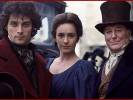Eye For Film >> Movies >> Middlemarch (1994) Film Review
The depth of George Eliot's saga of everyday privileged folk in a small English town in the middle of the 19th century is impressive. More than six hours of viewing is not only pleasurable at every level, but unfulfilled. When it's over and the narrator explains what happens to the main characters, you want to stay with them and follow their lives all the way.
Dickens is more dramatic and certainly more sentimental. Eliot is wonderful on marriage and repressed emotion and the destructive power of gossip. When an upper-class matron says, "People from manufacturing towns are always disreputable," it is not meant as a mocking reference to aristocratic arrogance, rather an example of drawing room parlance.

The leading characters are serious about life and its inequalities. Politics, with a large and small "p", is at the centre of Andrew Davies's skilled adaptation. In the end, money matters more than whether you are "the son of somebody." Without it, reputations are lost and furniture repossessed.
Dr Lydgate (Douglas Hodge) comes to Middlemarch as an idealistic doctor, with private means, who wants to make his mark on medical science. He learns fast that in order to be appointed as the administrator of the new free fever hospital, he has to tow the line with the chairman of the committee (Peter Jeffrey), whose religious zeal hides darker secrets.
Dorothea (Juliet Aubrey) lives with her ebullient uncle (Robert Hardy) and silly sister in a big house in the country. She worries about the poor and is determined to do something good with her inheritance. She has socialist ideas before socialism exists and marries an older man (Patrick Malahide), because she falls in love with his mind.
Will Ladislaw (Rufus Sewell) is related to Dorothea's husband. He has the brooding dark looks of a poet, although dabbles in art, while confessing, with undue modesty, that he doesn't have talent. He sympathises with Dorothea's ideas and she sees in him an ally and a friend. He sees more, becoming increasingly infatuated with her.
This only skims at the surface of the story, so rich in incident and feeling. No one is spared the sting of fate's cruel hand. Love is anguish, it seems, and marriage riven by false hopes. "There is so much suffering in the world," Dorothea says. "Like a muffled cry on the other side of silence."
Anthony Page directs with particular emphasis on performance. Hardy is superb, playing a natural clown, who drifts out of his depth into politics, and Aubrey brings to Dorothea a strength of character that contains inexplicable passions, too wild to free.
Eliot understands the complexities of human nature and does not humour them with easy answers. Ladislaw sees a future, in which equality of opportunity might exist, something that won't happen for 100 years, and Lydgate suffers the trials of an extravagant wife (Trevyn McDowell), with the knowledge that she kicks over his dreams.
The production is flawless and the acting a joy. It would be difficult to imagine a great book done better for the screen.
Reviewed on: 20 Sep 2001


















